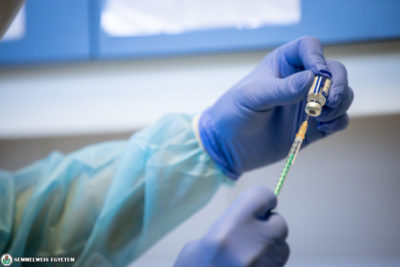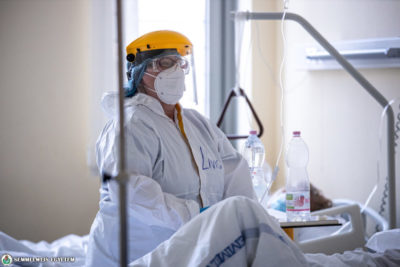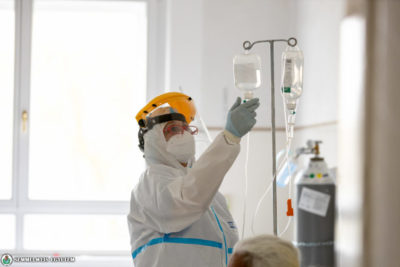The coronavirus epidemic affects not only the work of the university’s patient care units, but also the financial and economic directorates, as they create the conditions for the institution’s departments and educational units to run smoothly even during a pandemic, so that Semmelweis University is able to respond to a rapidly changing, emergency situation. Szilvia Nándori, Directorate of Healthcare Networking Management; Beatrix Sereg, Directorate of Central Economic Networking Management; László Nagy, Directorate of Educational Networking Management; Dr. Dénes Farkas, Directorate of Procurement; and Gergely Kiss, Directorate of Controlling, shared with us the main challenges and experiences of the past year.
“We have become more sensitive towards each other”
Szilvia Nándori, Director, Directorate of Healthcare Networking Management
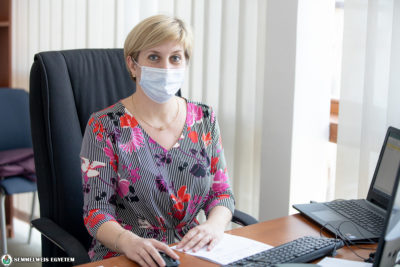 “Due to the appearance of the coronavirus, a great collaboration was needed that affected the entire university, during which the cooperation between the individual fields became even more important”, Szilvia Nándori said.
“Due to the appearance of the coronavirus, a great collaboration was needed that affected the entire university, during which the cooperation between the individual fields became even more important”, Szilvia Nándori said.
As the Director of the Directorate of Healthcare Networking Management has pointed out, they have been playing their part in the fight against the epidemic mainly by providing protective equipment. The directorate collects needs and initiates the procurement process, acting as a kind of liaison between each block, department and the Directorate of Procurement. In addition to the tasks serving the front line, Szilvia Nándori also emphasized that in order to provide the information necessary for the emergency management of the country, the obligation to provide immediate data has multiplied in addition to the already increased tasks. Since the beginning of the outbreak of the epidemic, they must report every day about the stock of protective equipment available at each unit and the data about their daily use to the health management bodies and the maintainer.
“In cooperation with the Directorate of Controlling, a well-functioning, structured online interface helps our work”, she explained.
The effects of the pandemic could already be felt by the staff of the directorate when the coronavirus appeared in Hungary in March, as a general shortage of stocks and a sharp market situation emerged almost immediately in terms of protective equipment.
In addition to the increased workload, Szilvia Nándori considered the fact that they had to include inventory management tasks in their scope of activities as the biggest difficulty. They also had to set up a system of records in which the costs related to COVID care are collected separately from the general operating expenditure. All this is particularly complicated, because in the departments these two have run in parallel or continue to do so ever since. The director added that they had to adapt very quickly, as they had to respond not only to the ever-changing legislation on procurement, but also to the market situation and ever-changing needs.
According to Szilvia Nándori, one of the biggest benefits of the unusual situation is that while in the past everyone tried to perform well, focusing primarily on their own territory, during the epidemic they could experience that only cooperation can be the way to achieve the goals.
“We got to know each other a little better, and also what difficulties and problems other areas may have. That is why we have become more sensitive towards each other”, she pointed out.
Effective cooperation must be strengthened
Beatrix Sereg, Director, Directorate of Central Economic Networking Management
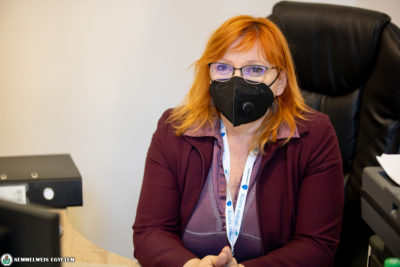 The Directorate of Central Economic Networking Management was established by a decision of the Senate in January last year. In March, when the emergency situation was declared due to the coronavirus, staff members were still being recruited and they were just moving into the new office, so they had to respond extremely cautiously and flexibly to the challenges caused by the pandemic.
The Directorate of Central Economic Networking Management was established by a decision of the Senate in January last year. In March, when the emergency situation was declared due to the coronavirus, staff members were still being recruited and they were just moving into the new office, so they had to respond extremely cautiously and flexibly to the challenges caused by the pandemic.
In the current epidemic situation, the Directorate of Central Economic Networking Management performs, among other basic tasks, the financial, economic and accounting tasks related to the procurement initiated by the government on behalf of the Ministry of Innovation and Technology.
Since the second wave of the epidemic, the purchased equipment and tests have arrived at the warehouse of Semmelweis University on Kőbányai út, and in accordance with the decision of the Operational Staff, these are handed over from here to the university’s organizational units, the National Ambulance Service and other medical universities of Hungary.
According to the director, the past period has been very instructive, with a wealth of experience and new knowledge gained and to be gained by those involved in defense to this day.
“Close cooperation is essential between both internal and external partners”, highlighted Beatrix Sereg.
She especially emphasized the joint work with the staff of the Directorate of Procurement, the Directorate of Finance, the university pharmacies and the Central Warehouse.
“The university’s digitalisation efforts have even more come to the forefront”
László Nagy, Director, Directorate of Educational Networking Management
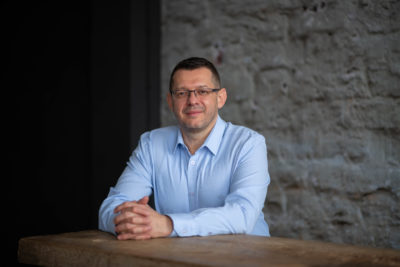
The Directorate of Educational Networking Management works primarily with faculty economic directorates and educational block directorates to provide educational background. According to László Nagy, the epidemic caused by the coronavirus also brought significant changes last spring in the fields of higher education, public education and vocational training.
“Initially, it was a serious task to arrange the necessary requirements for the organizational units providing practical training to be prepared to meet epidemiological standards, to have regular disinfections, to measure the temperature of those who enter the buildings, and to have all protective equipment available”, highlighted the director.
According to the director, the university staff quickly adapted to the unusual situation, and it was also due to this that the education could continue uninterrupted in the so-called hybrid form. In his opinion, the epidemic situation has brought many changes in work that will be worth maintaining even after the pandemic.
“I find online meetings more effective than traditional meetings: not only can you work in a more focused way, but you can also save a lot of travel time. In addition, I believe that the measures introduced due to the emergency situation have also resulted in a change of attitude: the university’s digitalisation efforts have become even more important”, the director recalled.
He also highlighted as a positive outcome that he and his colleagues could always count on each other in this unusual situation, even when performing their increased amount of tasks. It was a memorable case for him to co-operate when the university logo textile masks arrived at the Directorate-General of Economic Management: the nearly 9,000 masks were sorted and grouped by staff members and senior colleagues in the secretariat to ensure that all departments had access to the right amount of protective equipment as soon as possible.
Special purchasing needs in an unusual situation
Dr. Dénes Farkas, Director, Directorate of Procurement
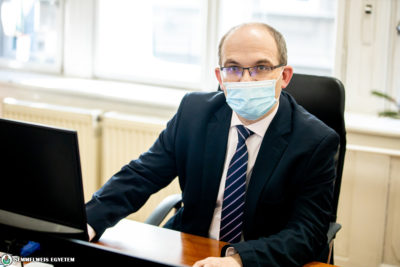 “After its appearance in Hungary, the coronavirus epidemic had an impact on the Directorate of Procurement almost immediately. Within days after the announcement of the emergency situation in March, we had to meet special needs”, recalled Dr. Dénes Farkas, director.
“After its appearance in Hungary, the coronavirus epidemic had an impact on the Directorate of Procurement almost immediately. Within days after the announcement of the emergency situation in March, we had to meet special needs”, recalled Dr. Dénes Farkas, director.
They had a short deadline to acquire equipment that was not or less typical before: special protective equipment and medical equipment, or even ventilators. By default, public procurement is an open, publicity process, which is a time-consuming process, but due to the epidemic, the university and its departments needed disinfectants or protective equipment in a short time, just like other domestic health care institutions or all institutions worldwide.
“The legislator recognized this, and at the end of March, a government decree was issued allowing the use of so-called exempted procurement procedures”, emphasized Dr. Dénes Farkas.
The name of the procedure suggests that domestic healthcare institutions must submit an application for an exemption. This was done by the Directorate of Procurement at the university. If the application is approved by the competent ministry and subsequently by the Operational Staff, the procurement procedure can be carried out.
“We have filed nearly 100 exemption requests since March and are still filing”, the director pointed out.
Since the onset of the epidemic, the Directorate of Procurement has sought to meet the needs of the Clinical Center and the various departments and other organizational units of the university through such exemption procurement procedures in addition to public procurement, which is its main profile.
According to Dr. Dénes Farkas, the greatest difficulty was caused by the fact that this type of procedure was under-regulated in the initial period of the epidemic situation. On the other hand, with the outbreak of the pandemic, demands for the same devices appeared almost everywhere in the world at the same time.
“It mainly happened during the first wave, worldwide, that companies, that is to say potential bidders, were in an unequal bargaining position with the contracting entity, that is to say against healthcare institutions”, the director explained.
Dr. Dénes Farkas considered the procurement related to the H-UNCOVER national representative coronavirus screening as one of the most memorable events. The procurement of all tools and equipment related to the project, which was attended by the four Hungarian medical training universities and led by Semmelweis University, was arranged by the Directorate of Procurement. He highlighted that new, cross-professional dimensions of collegiality had emerged within the university in the state of emergency, which was perhaps the only positive outcome of the epidemic in his view.
“An unprecedented cooperation has developed”
Gergely Kiss, Director, Directorate of Controlling
“When the outbreak of the epidemic happened last spring, the Directorate of Controlling was working on budget planning. Coronavirus had thoroughly turned our work upside down, as we also had to take care of significant changes related to funding. Based on the decision of the university management, we included force majeure frameworks in the 2020 management budget, which could serve to cover the additional costs related to the epidemic situation”, explained Gergely Kiss, director.
“The main task of our unit is to compile the management budget and strategic decision-making materials, so it was a new challenge for us to fulfill the ad hoc data related to the pandemic on a daily basis”, he said.
As the costs associated with the coronavirus had to be accounted for and reported separately, a completely separate area had to be created in the management system for this.
“Although in the dynamically changing external environment, it was more difficult than before to meet the directorate’s goal of delivering the right information at the right time, to the right place, thanks to the dedicated work of my staff, the close cooperation with the networking management directorates and the Directorate of IT, I feel that we are succeeding in overcoming the obstacles”, the director highlighted.
“We learned a lot from the first wave, which is why we were much more experienced by the autumn epidemic period, and our work was easier in terms of records and framework management”, pointed out Gergely Kiss.
He considers the cooperation between the central organizational units as the biggest lesson of the recent period.
“An unprecedented collaboration developed, everyone helped the other as much as they could. Many people have seen online discussions, the digitalisation of economic processes as a forced solution, but today it can all be interpreted as a saving of resources. Summarizing the experiences, the epidemic does not only deprive us of things, but also provides new solutions”, Gergely Kiss said.
Ádám Szabó
Photo: Attila Kovács – Semmelweis University, Tamás Molnár – Motomfoto
Translation: Katalin Illés-Romhányi
